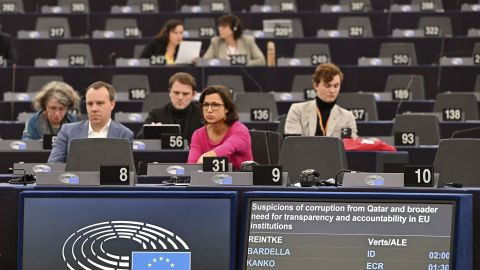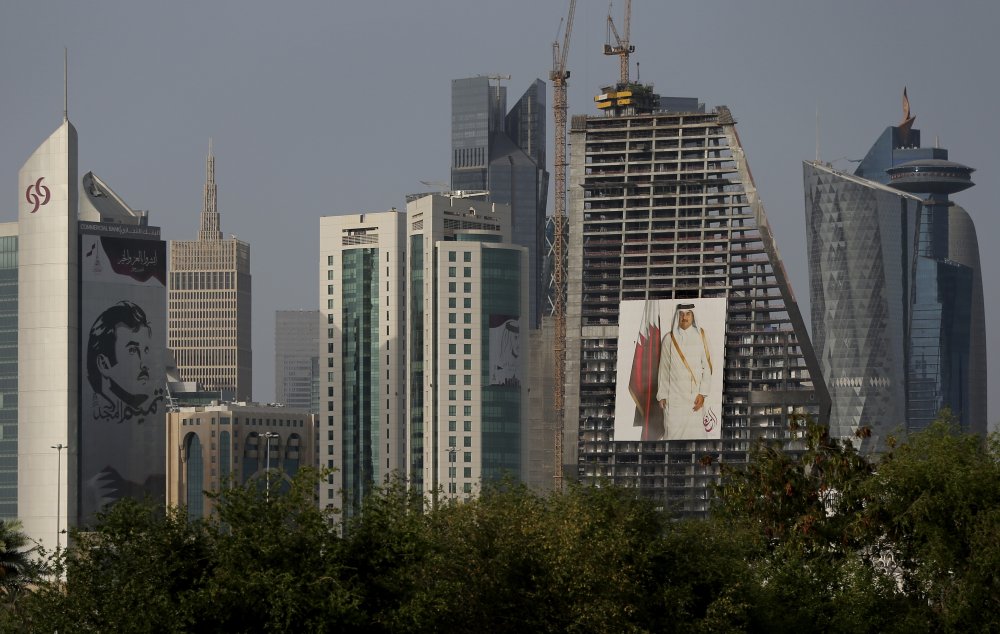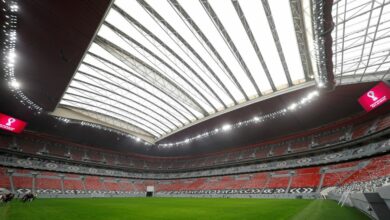
As the world’s attention was focused on the conclusion of the World Cup in Qatar last week, a political scandal was brewing in Europe with the small gas-rich nation at its center.
Authorities in Belgium arrested four people on December 9 under suspicion of having received gifts and favors from Qatar as part of efforts to influence decision-making at the European Parliament.
Politicians and commentators in Europe described the incident as the biggest corruption scandal to hit politics on the continent. Lawmakers suspended Qatar’s access to the European Parliament and put on hold legislation related to aviation and visa liberalization.
Doha has strongly denied involvement, warning that the decision to “impose such a discriminatory restriction” on Qatar before the legal process has ended could impact cooperation.
The scandal is the latest dent in the Gulf nation’s relations with European countries after deep differences over Qatar’s hosting of the FIFA World Cup simmered recently.
Here’s what you need to know about the turbulence in Qatari-European relations:
What is the bribery scandal that has rocked the EU and how has Qatar reacted?
Belgium’s federal prosecutor said earlier this month that for two years, federal police inspectors “suspected a country from the Persian Gulf of influencing economic and political decisions of the European Parliament,” according to public broadcaster RTBF.
Of the four people who were subsequently arrested, the most high-profile individual is Greek lawmaker Eva Kaili, who was stripped of her role as one of the parliament’s 14 vice presidents on Tuesday.
A lawyer for Kaili’s family, Michalis Dimitrakopoulos, told CNN Tuesday that her position “remains that she is innocent and that she has nothing to do with bribery from Qatar.”
Qatar has hit back, accusing those involved in the investigation of leaking “inaccurate information.” It has also protested being singled out in the investigation before its conclusion.
“Qatar was not the only party named in the investigation, yet our country has been exclusively criticized and attacked,” a Qatari diplomat said in a statement on Sunday.
Where does Qatar’s relationship with the EU stand today?
Qatar has largely dominated European headlines this year for two reasons: Gas and football.
The controversies surrounding its hosting of the World Cup have attracted bad press in Europe, which Qatari Emir Sheikh Tamim bin Hamad Al Thani has described as a “ferocious” campaign against his country and questioned “the real reasons and motives” behind it.
European states participating in the tournament made their positions clear from their capitals as well as on the football pitch and in the stands. German players covered their mouths in a pre-match photo in protest over a ban on wearing rainbow-colored armbands, a planned statement against Qatar’s anti-LGBTQ rules. A German minister wore the “OneLove” armband at the same game in defiance of restrictions on LGBTQ symbols.
But criticism of the tournament in the Western press went beyond LGBTQ issues and the plight of migrant workers in Qatar, prompting regional activists and journalists to accuse Western media of anti-Arab prejudice.
“The cultural rifts that have emerged in Europe during the World Cup are not specific to Qatar but affect the wider Gulf,” said Andreas Krieg, an associate professor at King’s College London. “What is happening to Qatar is seen as European privilege, closed-mindedness, Islamophobia and racism.”
Qatar’s role as a potential replacement for Russian energy supplies has also been touted in Europe as the continent tries to wean itself off Moscow’s gas following its war on Ukraine. That could magnify the effect of any strain on Qatari-European
relationships, said Kristian Coates Ulrichsen, a fellow at Rice University’s Baker Institute in Houston, Texas.
“There is a more assertive mood in Doha… borne out of a feeling that European states more than ever are seen to be seeking energy and investment from the Gulf even as coverage over the World Cup has in the view of many across the region been deeply offensive in its tone,” he told CNN.
Qatar, which has the third biggest gas reserves in the world after Russia and Iran, will stand “in solidarity” with Europe amid a gas shortage, Energy Minister Saad Sherida Al-Kaabi told CNN in March. German Chancellor Olaf Scholz said earlier this year that Qatar will play a “central role” in his country’s energy strategy and the Gulf nation signed its first gas deal with Berlin last month.
Qatar is also a major investor in Europe. It is one of the biggest property owners in the United Kingdom and owns trophy assets in London such as the Harrods department store and the Shard skyscraper, as well as a 20% stake in Heathrow airport. In France, the second-biggest destination for Qatari investments, it has over $26 billion in assets, and has created about 72,000 jobs.
Is Qatar likely to retaliate against the EU as relations take a dive?
Qatar has expressed concern about the “wave of attacks” it is facing in European media.
After news of the bribery scandal broke, European Parliament President Roberta Metsola delivered a scathing attack on the “enemies of democracy” in an address to the legislature. She suggested that the bloc was ready to sacrifice its burgeoning energy ties with Qatar as a result. “We are Europeans,” she said. “We’d rather be cold than bought.” Qatar has been keen to dispel the notion that it would weaponize its vast gas reserves. When its neighbors, including Saudi Arabia and the United Arab Emirates, imposed a boycott designed to cripple its economy in 2017, Doha continued to supply the UAE with gas. Qatar’s friendly relations with Iran can be attributed to gas diplomacy, too. The two nations share the world’s biggest gas field, known in Qatar as the North Field.
In a statement to CNN, Qatar noted its position as an important supplier of liquefied natural gas (LNG) to Belgium and warned the EU that the ongoing episode could affect “discussions around global energy poverty.”
But Qatar could find other ways to let its grievance with Europe be known. After London’s transport authority banned Qatari advertisements in protest of its position on LGBTQ issues, for example, Doha began a review of its investments in the city, the Financial Times reported.
Qatar didn’t respond to CNN’s request for comment for this article.
Ulrichsen said European officials and diplomats have tried to push back against the negativity of media coverage during the World Cup. French President Emmanuel Macron made a very public appearance at the tournament, attending the semifinal and final matches. When Qatar’s Sheikh Tamim handed out medals to the tournament’s Argentinian winners on Sunday, Macron was by his side.
Krieg said Qatar’s signing of a gas contract with Germany suggests that it isn’t going to politicize business dealings.
“I think the current warnings expressed by Qatar are a show of force and are unlikely going to translate into quid pro quos. Qatar has no tradition of playing hardball,” said Krieg. “They tend to be accommodating but patience has run low. And Europeans would do well to take Qatari and Gulf concerns into consideration.”
The digest
Sweden’s blocking of Turkish man’s extradition “very negative,” Ankara says
The Swedish Supreme Court’s decision to block the extradition of Turkish journalist Bulent Kenes is a “very negative” development, Turkey’s foreign minister said Tuesday, as Stockholm seeks Ankara’s approval for it to join NATO, Reuters reported. Sweden’s Foreign Ministry said it was bound to act in accordance with the court’s ruling.
- Background: Finland and Sweden both asked to join NATO in May in the wake of Russia’s invasion of Ukraine, but their bids require the approval of all 30 NATO member states, including Turkey. In June, Sweden and Finland agreed to take a number of steps to overcome Turkey’s objections, signing a three-way agreement.
- Why it matters: One of Turkey’s demands was that Sweden and Finland extradite suspects it seeks over terrorism-related charges. Turkish President Tayyip Erdogan last month singled out Kenes as a person Ankara wants extradited from Sweden. Ankara says Kenes is a member of an organization that it accuses of orchestrating a 2016 coup attempt.
Regional: #Bisht
The Qatari emir’s placing of the Arab “bisht” cloak around Argentinian footballing legend Lionel Messi’s shoulders after his team won the World Cup became the subject of an intense online debate.
The term was trending in several Arab countries, and it quickly became the subject of internet memes, with Arabs taking pride in the entire tournament and particularly the closing ceremony carrying a distinctly Middle Eastern flavor.
But not everyone shared that joy. Critics of the move decried it as a publicity stunt on Qatar’s part, saying that the moment should belong to the winning players, not the hosts. “Grossly indulgent,” Laurie Whitwell, a sports journalist, tweeted.
Many Arabs however felt targeted by the controversy, countering that awarding of a bisht was the highest mark of bestowing honor and prestige in Arab culture.
Sultan Al Musa, a writer from Saudi Arabia, suggested that the controversy around Messi’s wearing of the cloak likely had to do with its “Arab connotations,” pointing out that other instances of sportsmen wearing cultural items of clothing are considered signs of “cultural coexistence.” The post was retweeted almost 6,000 times.
Conservative Kuwaiti lawmaker Waleed Al Tabtabaie called the bisht gifting and Qatar’s hosting of the tournament as the “pinnacle of creativity” in trying to reverse what he said was an attempt by Hollywood to distort the image of Arabs and Muslims as backward and violent.
Others shared images of Argentinian fans buying bishts in the markets of Doha as a testament to their appreciation of the emir’s gesture towards Messi.




